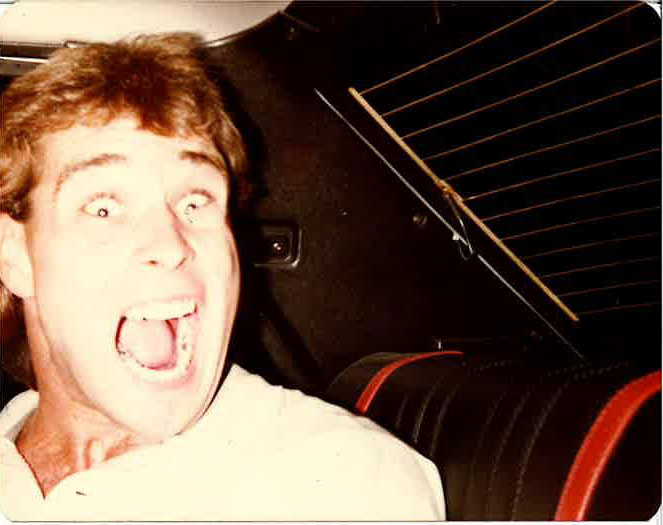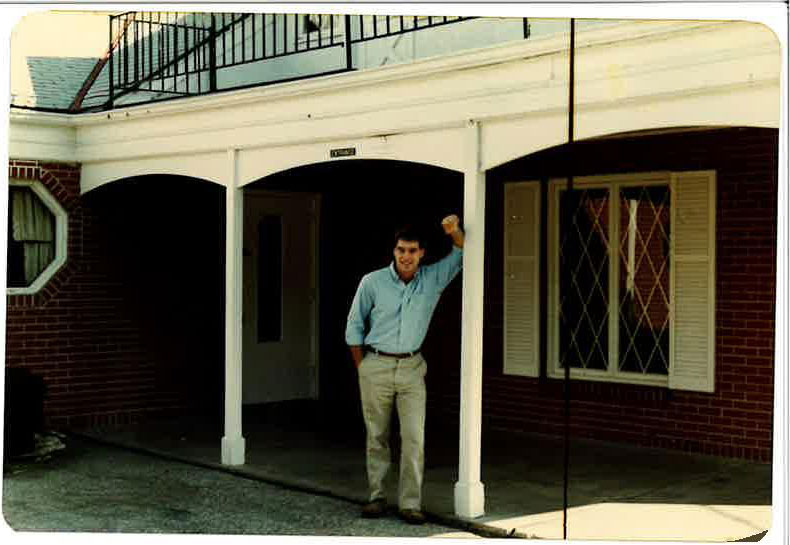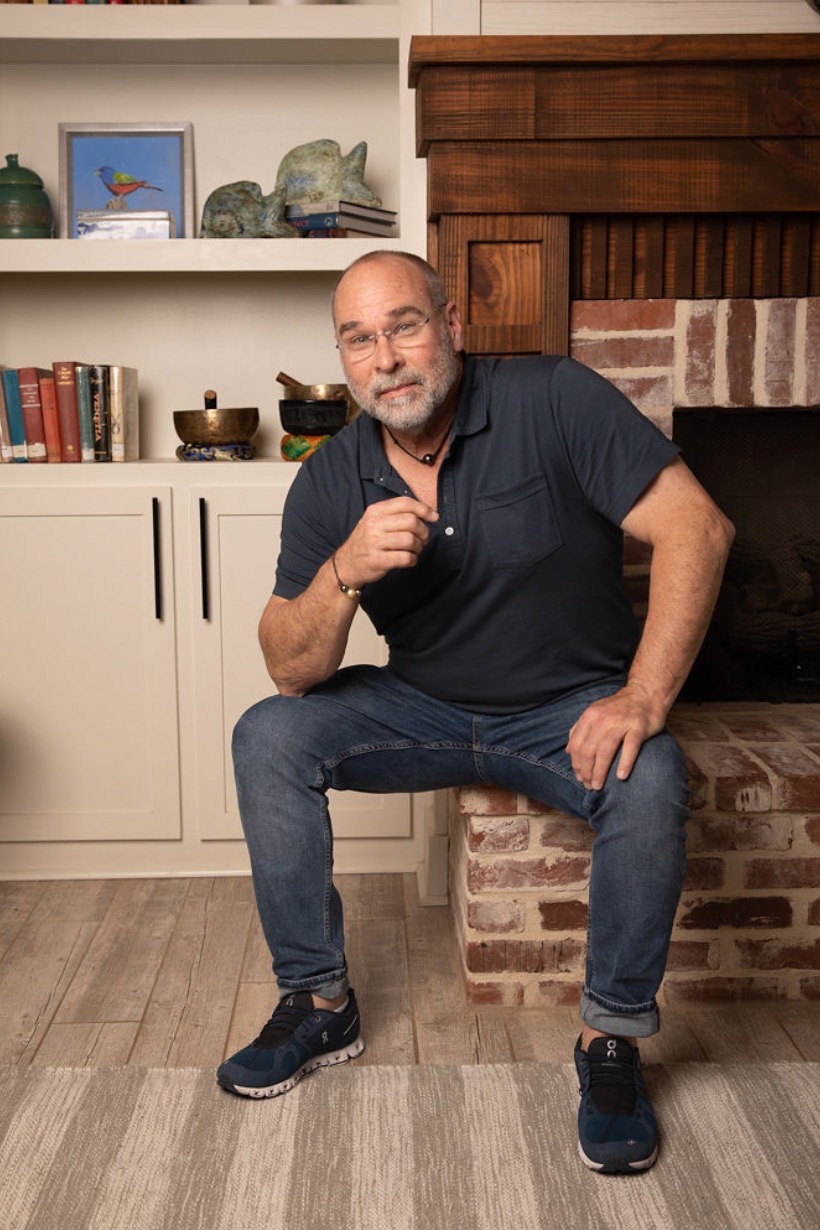By Katie Eubanks Ginn

Restaurateur Robert St. John owns six eateries in Hattiesburg and metro Jackson; writes columns and cookbooks; travels to Europe for work and play; produces documentaries on notable Mississippians like Walter Anderson and Eudora Welty; and recently co-founded the Institute for Southern Storytelling at Mississippi College. He is also founder of the nonprofit Extra Table, which supplies healthy food to Mississippi food pantries and soup kitchens. He and his wife, Jill, have two children and live in Hattiesburg.
He’s been able to achieve and enjoy all this, by the grace of God, largely because he hasn’t tasted a drop of alcohol in 40 years. In honor of National Recovery Month, Robert shared his story with MCL.
Katie Eubanks Ginn: When would you say your addiction became “active”?

Robert out of control during his addiction.
Robert St. John: I can pinpoint a time when my drinking career went from having the world by the tail and being the fun guy, to (a place where) I started paying consequences … It was a couple-of-month period.
You know, I took my first drink when I was 14. I thought it would be cool. I was hanging out with older kids.
(Later) I had friends (who) drank and partied as much as I did — but they could get up and go to class, and make a 3.5 (grade point average), and hold down two jobs. There was no way I could do that. Once I started drinking, I couldn’t stop. There’s a whole mental obsession that kicks in (with addiction). The only way to cure that is complete and total abstinence.
It never made sense to me when someone would say, ‘Let’s go out for a beer.’ A beer? I’m gonna have a case!
KG: You flunked out of college, your mom kicked you out of the house, you got a DUI at 21, and you went to rehab. Then you experienced your first bit of ‘sober fun’ while roller skating with others from rehab. Had you had any restaurant experience by then?

Robert at the halfway house in Omaha, Nebraska, where he lived after getting treatment
RSJ: So I flunked out of school at 19, started working in restaurants, loved it, and that was a year and a half or two years before my DUI.
They told me in treatment, don’t work in a restaurant for a year. They didn’t want me to be around alcohol, which was a good idea. So I worked for a stereo store in Jackson (after rehab).
I moved to Jackson after treatment because Hattiesburg in the fall of ’83 — today, it’s a great recovery community — but back then, there were (only) seven 12-step meetings a week, and two people my age at those meetings. When I moved to Jackson, I made friends and we went to the movies, went bowling and things like that.
KG: How did getting sober change your spiritual life? Did it change how you saw Jesus?

The St. John family on their Christmas vacation last year. From left_ Harrison, Jill, Holleman, and Robert
RSJ: I grew up in the Methodist church. When the doors were open, I was there. I’m still a member of that church, Main Street United Methodist Church here in Hattiesburg. I had a great youth pastor that I connected with. (That) probably saved me from going deeper (into addiction) quicker.
I was saved at a James Robinson Crusade at Hattiesburg High football field in 1973 — but I never had any kind of spiritual relationship. I just saw it as this thing you do. I was into church more for the community than the message.
It was only through 12-step recovery that I developed a deeper spiritual life. I just call it getting ‘spiritually fit.’ And that is praying and meditating and giving credit where credit’s due (to God).
I’ll just tell you, when it says, ‘O ye of little faith,’ that’s me. It’s a struggle sometimes. But when I can look at the big picture from a bird’s-eye view … I can see God in my life really with just His hand on me the whole time.
KG: It seems like most of the fun stuff in your life has come after sobriety.

There’s a whole mental obsession that kicks in (with addiction), Robert says. The only way to cure that is complete and total abstinence.
RSJ: I haven’t missed a thing!
I wish someone in that halfway house in Omaha, Nebraska, in 1983 had said, Robert, get out a piece of paper, and write down what you think your best life could be going forward without alcohol or drugs.
I wish I would have that paper today (because) I would’ve so undershot what a life in sobriety has given me — and not the monetary and material things. It’s the spiritual and relational things.
KG: What are your ‘five Fs,’ and when did you come up with them?
RSJ: Faith, family, friends, food, and fun, in that order. I probably came up with them around the time my daughter was born.
I realized that when I put faith first, then my family, then my friends, then food — and food is biblical, when you think about the loaves and fishes and the last supper — food is this connection — when you look back at the best times in your life, (they involve) food — then the fun part just comes.
Sunday lunch at my grandmother’s house, which I still write about, had such an impact on me. (There was) faith, family was there, friends were always invited, there was excellent food, and the fun.
KG: Why has it been important for your recovery to involve other people, and being open with others?
RSJ: At first, in rehab, you’ve got people to guide you through a whole new way of life. It’s a literal 180. At 21 years old, I (was) ill-equipped to deal with normal life problems, because my solution was just to get loaded, which just makes the problem worse. So I had no life skills. None. So rehab is important for that. And it’s important to physically keep you away (from alcohol and drugs).
Then (after rehab), that’s why I moved to Jackson, because there were people in community — young and having fun (without alcohol or drugs). That’s why that’s important. Community in every aspect is important.
KG: What do you think your calling is, as a Christian restaurant owner, and what helps you live that out?
RSJ: I tell you what I enjoy: I enjoy creating opportunities for people and growing. Jarred Patterson, who’s my partner at Enzo (in Ridgeland), he started with me as a server 15 years ago, and now he owns 50 percent of the business. At Tabella, Steve and Stacey Andrews, he started as a prep cook in 1987 at the Purple Parrot, she was a hostess, they met, they married, they got into management, and now they own a third of Tabella.
We have 500 people or so who work for the company now, between here (in Hattiesburg) and the Jackson area. So I love that.
But Extra Table is really, I think, what I was put here to do. Sometimes I’ve said, do I want to be the guy that fed people filet mignon, or the guy that fed people canned tuna? And it’s an easy answer: canned tuna. I need to feed (people) filet mignon to pay the bills and get the kids through college, but I’m supposed to be doing the other.

